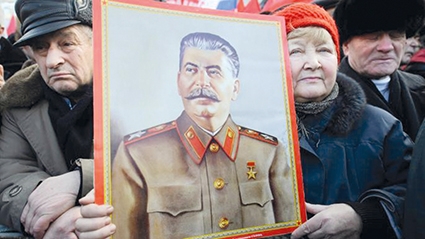A Georgian on Russians’ Minds: A Story of Stalin’s Popularity
According to results released by independent pollster Levada Center on April 16, approximately 70% of the Russians consider the Soviet leader Joseph Stalin to have played a completely positive or relatively positive role in Russian history. This is a considerably higher number in Stalin-admirers when compared with the 54% figure recorded in 2016.
Historians and Kremlin critics say that under Putin, who has been in a leading role (as President or Prime Minister) since 1999, the Russian authorities have sought to play down Stalin's crimes. While he has criticized Stalin at times, Putin praised the dictator at least once in the past as an "effective manager" and said in June 2017 that the "excessive demonization" of Stalin is "a way of attacking the Soviet Union and Russia."
The recent findings were met with irony and concern both in Russia and globally. Many still wonder how a man with the dossier of millions killed under his rule can be acclaimed as a true leader by the majority of Russians.
This says a lot about Russian thinking nowadays. Communism was rejected even in the late 1980s, as modern Russians are way better-off materially than in Soviet times. And yet, the Soviet leader is gaining more and more popularity. Many in the West attribute this rise to the fact that economic life in Russia now getting harder: foreign policy has been unsuccessful, resulting in a number of Russia’s neighboring countries falling away (at least partially) from Russian geopolitical influence.
Moreover, there are signs that discussions have begun to circulate within the Russian intellectual elite that the country’s foreign policy and, generally, its course of economic and political development should be reconsidered. In that sense, many believe that Stalin’s popularity is solely based on the fact that Russians are disenchanted with the modern ruling elite.
This might be true to a certain extent, but we should also consider another development in Russia: the centralization of power around a certain group of people headed by the incumbent President Vladimir Putin.
It is a general rule in history that a leader, in order to prove himself, relies on historical factors. The Russia political elite, through its new laws on internet restriction, limitation of government criticism, etc., uses examples from Russian history when all of this was the order of the day.
In other words, Stalin’s rule is a good instrument to show to the Russian public that what is happening in the country now already has a historical precedent.
In fact, western approaches to Stalin’s popularity miss out on one crucial element: within the context of Russian history, Stalin has arguably been the most successful ruler. It had been a century-old issue for Russian rulers to exercise strict control over a large space, and lack of economic resources and effective bureaucracy always hindered the development of Russia. Stalin confronted Russia’s inhospitable geography and managed to build a state apparatus which was pretty much capable of controlling the entire geographic expanse. He also set out to resolve what had been a nightmare to his predecessors, the Romanovs: Russia’s industrialization, putting it on the same level as its military and economic capacity and the same level as in western states. Indeed, under his rule in 1929-1953, the Soviet Union was transformed into a superpower. Economic troubles existed, but he nevertheless managed to impose almost total control over the union.
As such, what we witness in modern Russia is quite logical: the underlining of the greatness of Stalin based on Putin’s quest to uphold his current centralization policies, as well as Stalin’s major achievements within the context of Russian history.
By Emil Avdaliani
Image source: thetimes.co.uk












